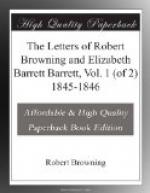Yes, but, dearest, you mistake me, or you mistake yourself. I am sure I do not over-care for forms—it is not my way to do it—and in this case ... no. Still you must see that here is a fact as well as a form, and involving a frightful quantity of social inconvenience (to use the mildest word) if too hastily entered on. I deny altogether looking for, or ‘seeing’ any ‘security’ in it for myself—it is a mere form for the heart and the happiness: illusions may pass after as before. Still the truth is that if they were to pass with you now, you stand free to act according to the wide-awakeness of your eyes, and to reform your choice ... see! whereas afterward you could not carry out such a reformation while I was alive, even if I helped you. All I could do for you would be to walk away. And you pretend not to see this broad distinction?—ah. For me I have seen just this and no more, and have felt averse to forestall, to seem to forestall even by an hour, or a word, that stringency of the legal obligation from which there is in a certain sense no redemption. Tie up your drinker under the pour of his nine gallons, and in two minutes he will moan and writhe (as you perfectly know) like a Brinvilliers under the water-torture. That he asked to be tied up, was unwise on his own principle of loving ale. And you sha’n’t be ‘chained’ up, if you were to ask twenty times: if you have found truth or not in the water-well.
You do not see aright what I meant to tell you on another subject. If he was displeased, (and it was expressed by a shadow a mere negation of pleasure) it was not with you as a visitor and my friend. You must not fancy such a thing. It was a sort of instinctive indisposition towards seeing you here—unexplained to himself, I have no doubt—of course unexplained, or he would have desired me to receive you never again, that would have been done at once and unscrupulously. But without defining his own feeling, he rather disliked seeing you here—it just touched one of his vibratory wires, brushed by and touched it—oh, we understand in this house. He is not a nice observer, but, at intervals very wide, he is subject to lightnings—call them fancies, sometimes right, sometimes wrong. Certainly it was not in the character of a ‘sympathising friend’ that you made him a very little cross on Monday. And yet you never were nor will be in danger of being thanked, he would not think of it. For the reserve, the apprehension—dreadful those things are, and desecrating to one’s own nature—but we did not make this position, we only endure it. The root of the evil is the miserable misconception of the limits and character of parental rights—it is a mistake of the intellect rather than of the heart. Then, after using one’s children as one’s chattels for a time, the children drop lower and lower toward the level of the chattels, and the duties of human sympathy to them become difficult in proportion. And (it seems strange to say it, yet it is true) love, he does not conceive of at all. He has feeling, he can be moved deeply, he is capable of affection in a peculiar way, but that, he does not understand, any more than he understands Chaldee, respecting it less of course.




